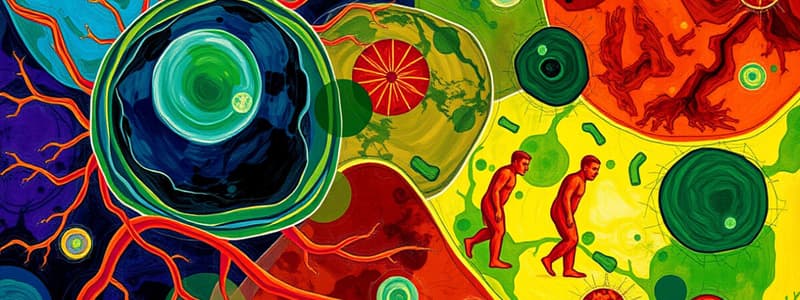Podcast
Questions and Answers
What type of cell lacks a nuclear membrane?
What type of cell lacks a nuclear membrane?
- Animal cell
- Prokaryotic cell (correct)
- Plant cell
- Eukaryotic cell
Which of the following best describes the role of decomposers in an ecosystem?
Which of the following best describes the role of decomposers in an ecosystem?
- They produce energy through photosynthesis.
- They compete with producers for sunlight.
- They consume plants and animals for energy.
- They break down organic matter, recycling nutrients. (correct)
What mechanism explains the process of species differentiation due to environmental changes?
What mechanism explains the process of species differentiation due to environmental changes?
- Natural selection
- Hybridization
- Geographic isolation (correct)
- Genetic drift
According to Mendel's law of segregation, what happens during the formation of gametes?
According to Mendel's law of segregation, what happens during the formation of gametes?
Which of the following is NOT a major type of biological macromolecule?
Which of the following is NOT a major type of biological macromolecule?
What is the primary function of mitochondria in a cell?
What is the primary function of mitochondria in a cell?
What describes the term 'niche' in ecology?
What describes the term 'niche' in ecology?
Which type of gene is expressed and observable when present?
Which type of gene is expressed and observable when present?
Flashcards are hidden until you start studying
Study Notes
细胞生物学
- 细胞是生命的基本单位。
- 细胞分为原核细胞和真核细胞。
- 原核细胞:如细菌,结构简单,无核膜。
- 真核细胞:有核膜和细胞器,如动物细胞和植物细胞。
- 重要细胞结构:
- 细胞膜:控制物质进出细胞。
- 线粒体:细胞能量产生中心。
- 内质网:合成和运输蛋白质与脂质。
- 细胞核:存储遗传物质DNA。
生态学
- 研究生物与其环境之间的相互作用。
- 生态系统组成:
- 生物因素:植物、动物、微生物。
- 非生物因素:水、土壤、气候。
- 生态位:物种在生态系统中的角色和功能。
- 能量流动与物质循环:
- 生产者(如植物)通过光合作用生产能量。
- 消费者(如动物)通过摄食获取能量。
- 分解者(如细菌、真菌)分解有机物,循环营养物质。
生物进化
- 生物进化是指物种随时间而变化的过程。
- 达尔文的自然选择理论:
- 适应性:生物体适应环境的能力。
- 生存竞争:种内和种间竞争影响物种存活。
- 物种形成的机制:
- 地理隔离:不同环境导致物种分化。
- 基因漂变:随机遗传变化影响物种特征。
- 进化证据:
- 化石记录:显示生命的历史变化。
- 比较解剖学:不同物种间结构的相似性和差异性。
遗传学
- 遗传学研究遗传信息的传递和变异。
- 基因:DNA的功能单位,控制性状。
- 孟德尔遗传定律:
- 分离定律:基因在配子的形成中独立分配。
- 自由组合定律:不同基因组合的可能性。
- 性状的显性与隐性:
- 显性基因:表现出来的特征。
- 隐性基因:在显性基因存在时不表现的特征。
生物化学
- 研究生命体内的化学过程与物质。
- 主要生物大分子:
- 蛋白质:由氨基酸组成,执行多种生物功能。
- 核酸:DNA和RNA,负责遗传信息的存储与传递。
- 碳水化合物:能量来源和结构功能。
- 脂质:组成细胞膜和储存能量。
- 代谢过程:
- 同化作用:合成大分子,储存能量。
- 异化作用:分解大分子,释放能量。
Cell Biology
- Cells are the fundamental units of life, classified into prokaryotic and eukaryotic types.
- Prokaryotic cells (e.g., bacteria) are simple in structure and lack a nuclear membrane.
- Eukaryotic cells possess a nuclear membrane and organelles, including animal and plant cells.
- Key cellular structures include:
- Cell Membrane: Regulates the entry and exit of substances in and out of the cell.
- Mitochondria: Serve as the energy production center of the cell.
- Endoplasmic Reticulum: Involved in synthesizing and transporting proteins and lipids.
- Nucleus: Stores genetic material (DNA).
Ecology
- Focuses on the interactions between organisms and their environment.
- Ecosystems comprise:
- Biotic Factors: Living entities such as plants, animals, and microorganisms.
- Abiotic Factors: Non-living components like water, soil, and climate.
- Niche: Defines the role and function of a species within an ecosystem.
- Energy flow and nutrient cycling occur through:
- Producers (e.g., plants) convert solar energy into chemical energy via photosynthesis.
- Consumers (e.g., animals) obtain energy by consuming other organisms.
- Decomposers (e.g., bacteria, fungi) break down organic matter, recycling nutrients.
Biological Evolution
- Describes the process by which species change over time.
- Key aspects include Charles Darwin's theory of natural selection:
- Adaptation: The ability of organisms to adjust to environmental changes.
- Survival Competition: Intraspecific and interspecific competition affects species survival.
- Mechanisms of speciation:
- Geographic Isolation: Different environments lead to species divergence.
- Genetic Drift: Random genetic variations impact species traits.
- Evidence of evolution includes:
- Fossil Record: Documentation of life’s historical changes.
- Comparative Anatomy: Examination of structural similarities and differences among species.
Genetics
- Studies the transmission and variation of genetic information.
- Genes: Functional units of DNA that determine traits.
- Mendel's Laws of Inheritance:
- Law of Segregation: Genes independently distribute into gametes during formation.
- Law of Independent Assortment: Different gene combinations can occur.
- Trait dominance:
- Dominant Genes: Traits that are expressed in the presence of other alleles.
- Recessive Genes: Traits that are masked when a dominant gene is present.
Biochemistry
- Examines the chemical processes and substances within living organisms.
- Major biomolecules include:
- Proteins: Composed of amino acids and perform a variety of biological functions.
- Nucleic Acids: DNA and RNA, responsible for the storage and transmission of genetic information.
- Carbohydrates: Serve as energy sources and structural components.
- Lipids: Form cellular membranes and store energy.
- Metabolic processes involve:
- Anabolism: Synthesizing larger molecules to store energy.
- Catabolism: Breaking down larger molecules to release energy.
Studying That Suits You
Use AI to generate personalized quizzes and flashcards to suit your learning preferences.




